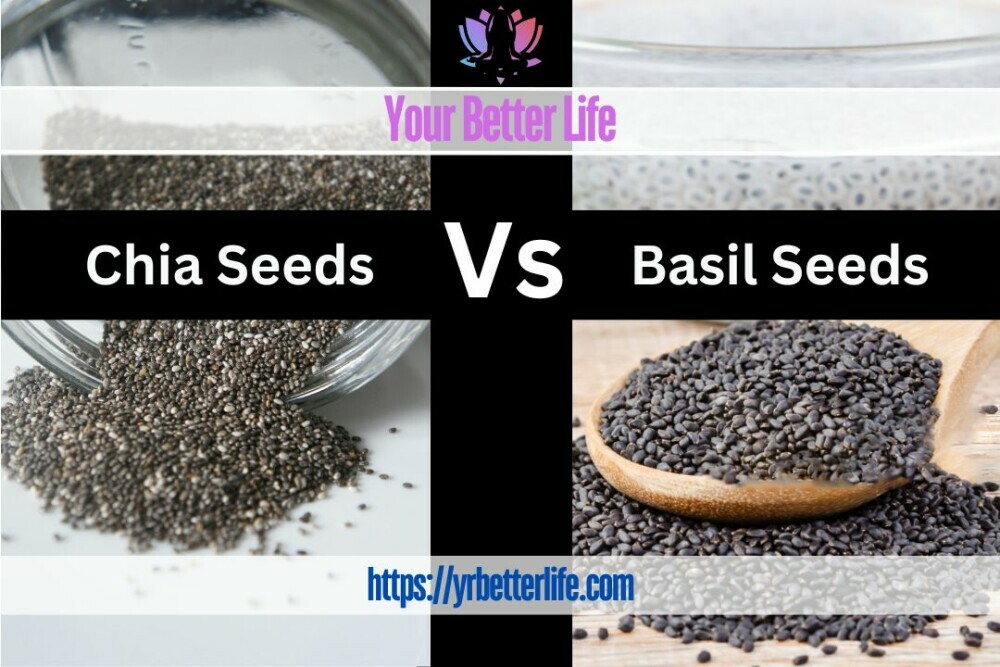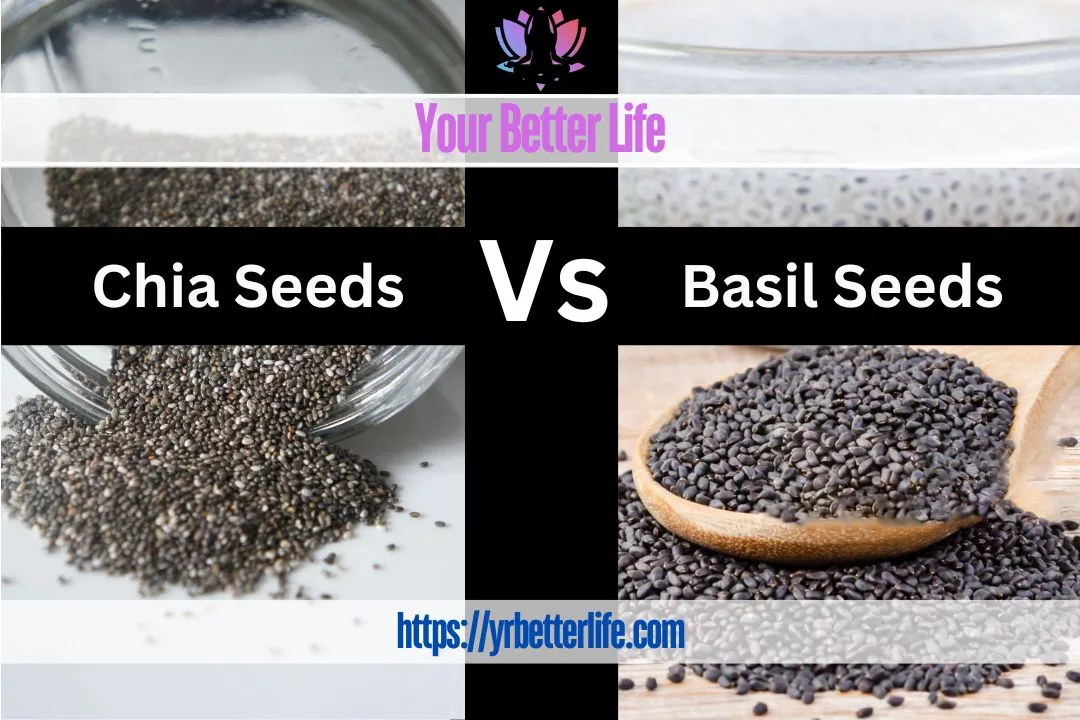
Well I have some news that might very well surprise you.
Basil Seeds vs. Chia Seeds: Why Basil Seeds Are Better for Your Health
In the world of superfoods, chia seeds have enjoyed the spotlight for quite some time. However, there’s another contender that is gaining attention for its remarkable health benefits—basil seeds. Often overshadowed by their more popular counterpart, basil seeds, also known as sabja seeds, tukmaria, or falooda seeds, offer a range of health advantages that might just make them a superior choice. In this post, we’ll dive deep into the benefits of basil seeds and how they compare to chia seeds, providing you with a thorough understanding of why basil seeds might be the better option for your health.
Nutritional Profile
Basil Seeds
Basil seeds are nutrient-dense, providing a good source of essential nutrients. Here’s a snapshot of their nutritional content:
Rich in Omega-3 Fatty Acids: Basil seeds are an excellent source of alpha-linolenic acid (ALA), a type of omega-3 fatty acid. Omega-3s are crucial for heart health, reducing inflammation, and supporting brain function.
High in Fiber: Basil seeds contain a significant amount of dietary fiber, which aids in digestion, helps regulate blood sugar levels, and promotes a feeling of fullness.
Protein: They are a good plant-based protein source, essential for muscle repair, immune function, and overall growth.
Vitamins and Minerals: Basil seeds are rich in vitamins and minerals, including calcium, magnesium, iron, and potassium. These nutrients are vital for bone health, energy production, and maintaining electrolyte balance.
Chia Seeds
Chia seeds are also packed with nutrients and have been celebrated for their health benefits. Their nutritional profile includes:
High in Omega-3 Fatty Acids: Similar to basil seeds, chia seeds are rich in ALA.
Rich in Fiber: Chia seeds are well-known for their high fiber content, which supports digestive health and helps in weight management.
Protein: Chia seeds provide a good amount of plant-based protein.
Vitamins and Minerals: Chia seeds contain calcium, magnesium, iron, and phosphorus, which are essential for overall health and well-being.
Health Benefits
Basil Seeds
Digestive Health: The high fiber content in basil seeds aids in digestion by promoting bowel regularity and preventing constipation. The mucilage in basil seeds forms a gel-like substance when soaked in water, which soothes the stomach lining and can help with conditions like acid reflux.
Weight Management: Basil seeds can be beneficial for weight management. The fiber content helps you feel full, reducing overall calorie intake. Additionally, they have a low-calorie count, making them an excellent addition to a weight-loss diet.
Blood Sugar Regulation: Basil seeds have a low glycemic index and can help regulate blood sugar levels. The fiber slows down the absorption of sugar in the blood, making them beneficial for individuals with diabetes or those looking to maintain stable blood sugar levels.
Cooling Effect: Basil seeds are known for their natural cooling properties, which can help in managing body heat during hot weather. This makes them a popular ingredient in various traditional summer drinks in many cultures.
Heart Health: The omega-3 fatty acids in basil seeds contribute to cardiovascular health by reducing inflammation, lowering blood pressure, and decreasing the risk of heart disease.
Chia Seeds
Digestive Health: The high fiber content in chia seeds supports healthy digestion and regular bowel movements. They can absorb large amounts of water, forming a gel that aids in preventing constipation and promoting gut health.
Weight Management: Chia seeds help in weight management by providing satiety and reducing appetite. Their high fiber and protein content contribute to a feeling of fullness.
Blood Sugar Control: Chia seeds can help regulate blood sugar levels. The fiber content slows down the absorption of sugar, making them beneficial for maintaining stable blood glucose levels.
Bone Health: Chia seeds are a rich source of calcium and phosphorus, which are essential for maintaining strong and healthy bones.
Heart Health: The omega-3 fatty acids in chia seeds are beneficial for heart health, reducing inflammation, and lowering the risk of cardiovascular diseases.
Comparison: Why Basil Seeds Might Be Better
Better Digestibility: Basil seeds are easier to digest compared to chia seeds. Chia seeds can sometimes cause bloating or digestive discomfort in some individuals due to their high fiber content and water-absorbing properties. Basil seeds, on the other hand, form a gel-like substance that is gentle on the digestive system and can actually soothe the stomach.
Cooling Properties: Basil seeds have natural cooling properties that are not found in chia seeds. This makes basil seeds an excellent choice for managing body heat and staying hydrated during hot weather. They are often used in traditional drinks to cool the body and provide relief from heat.
Faster Hydration: Basil seeds hydrate much faster than chia seeds. When soaked in water, basil seeds swell and form a gel-like substance within minutes, whereas chia seeds can take up to a couple of hours to achieve the same consistency. This makes basil seeds more convenient for quick preparation and immediate consumption.
Lower Calorie Content: Basil seeds have a lower calorie count compared to chia seeds, making them a better option for those who are calorie-conscious or looking to lose weight. They provide the same satiety benefits without adding extra calories to your diet.
Unique Culinary Uses: Basil seeds have unique culinary applications that can add variety to your diet. They are commonly used in Asian and Middle Eastern cuisines, particularly in desserts and beverages. Their ability to form a gel makes them a great thickening agent for smoothies, puddings, and other dishes.
How to Incorporate Basil Seeds into Your Diet
Incorporating basil seeds into your diet is simple and versatile. Here are a few ideas:
Basil Seed Drink: Soak basil seeds in water until they swell and form a gel. Add them to your favorite beverages like lemonade, fruit juices, or smoothies for a refreshing and nutritious drink.
Healthy Pudding: Mix soaked basil seeds with almond milk, sweeteners like honey or maple syrup, and fresh fruits to create a delicious and healthy pudding.
Toppings for Desserts: Use soaked basil seeds as a topping for desserts like yogurt, ice cream, or fruit salads. They add a unique texture and boost the nutritional value of your treats.
Baked Goods: Incorporate basil seeds into your baked goods like muffins, bread, and cookies. They can add a pleasant crunch and enhance the nutritional profile of your recipes.
Traditional Dishes: Explore traditional recipes from Asian and Middle Eastern cuisines that use basil seeds. Dishes like falooda, a popular Indian dessert drink, often feature basil seeds as a key ingredient.
Conclusion
While both basil seeds and chia seeds offer numerous health benefits, basil seeds stand out in several ways that make them a potentially better choice for your health. Their ease of digestion, natural cooling properties, faster hydration, lower calorie content, and unique culinary uses provide a compelling case for incorporating them into your diet. Whether you’re looking to improve digestion, manage weight, regulate blood sugar, or simply add variety to your meals, basil seeds are a versatile and nutritious option worth considering.
By understanding the differences and advantages of basil seeds over chia seeds, you can make informed decisions about which superfood best suits your health needs. Give basil seeds a try and experience the benefits they have to offer!
Let me know what you think about Chia Vs Basil seeds. I would love to hear your opinion and if you even knew about Basil Seeds.
With warmth & compassion
Shaun

